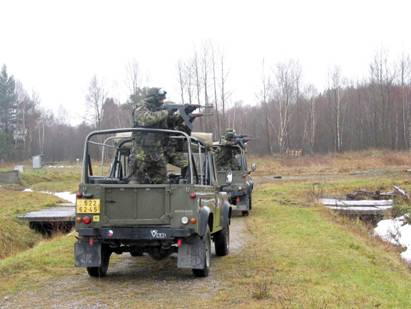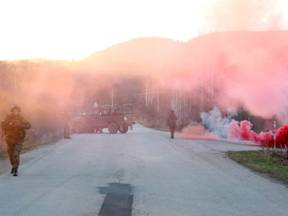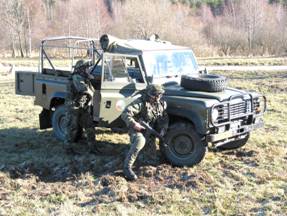Abstract The article refers to some experience from Military police of the ACR training for service within multinational mission in Iraq. The accent is put on providing both tactical training as well as psychological training. It points out the aim of training with the respect to mandate of contingent members. INTRODUCTIONMilitary policemen of the Czech Republic Army have been taking part in reestablishment of the democratic system in Iraq within a multinational mission for several years. As well as before other multinational missions abroad, military policemen undergo demanding training, part of which is not only practical training in tactics, but psychological training, too. TACTICAL TRAININGOne of the problems that the authors had to deal with in the military policemen training was professional aspect of the difference between the police tactics and mechanized infantry tactics. In the past, based on evaluated security threats and risks, mechanized infantry tactics was understood as a package of big units activities in great time and spatial expansion. At present, even members of these units fulfil tasks that are characterized by relatively small tactical units deployment in miscellaneous environment. Police tactics was different because it reacted on the role of military police and on the number of policemen deployed in the action. Police actions have been carried out especially against individuals, possibly against small groups of perpetrators, very often in specific environments and especially in built-up areas. It can be said that at present time there is not much difference between mechanized infantry and police units tactics. We assume that the right approach to this problem lies in a statement that there are not two different tactics, but just good or wrong tactics in the sense of progress of deployed units within fulfiling given tasks. In this respect, it is necessary to change thinking of armed forces members who, based on their past experience, understand the police tactics to be different from the mechanized infantry tactics. An important aspect of military policemen training before their mission is its content. Military police of the Czech Republic Army contingent has got an exactly set mandate in Iraq from which basic requirements on the contingent members follow. The mandate does not take into account combat activities. However, due to unstable security situation in Iraq, dealing with lots of crisis situations such as reactions to acts of sabotage and terrorist acts cannot be ruled out. That is why members of the military police contingent should also focus on purely combat activities in their training before they leave for a mission. Having the military policemen prepared just for particular non-combat tasks would be, in a certain sense, hazardous. Nearly every day multinational forces in Iraq encounter provocations, rocket and bomb attacks lead to bases and their parts, suicide bombers who lead their attacks to people or allied vehicles on the move. Due to given reasons, military police tactical training now includes the problems of creating formations (foot troops formations as well as vehicles formations) within fulfiling various tasks, breaking through obstacles and barriers, what to do during various ways of attacks in various kinds of environment, what to do when booby trapped, VIP protection, logistic and humanitarian convoys protection, etc. Basically, it is a matter of revising basic tactical activities of an individual and small teams and their subsequent improvement. It is so, because under the terms of fulfilling military policemen´ functional duties in their garrisons, activities mentioned earlier are neither practised nor used. As far as tactical training is concerned, it is necessary to focus on typal situations practice. It is important for the contingent members to understand that there is not such a thing as an exact algorithm of activities that would enable them to get safely out of a dangerous situation. It would be improper to learn standard and exactly given steps and procedures. Each particular dangerous situation is insofar special and unrepeatable due to its particular conditions. That is why it is not possible to sort the situation out using an exact algorithm of activities. For that reason, tactical training is focused on perfect mastering basic activities and exercises, and their correct use in dependance on inccured situation. Basic aspects that influence sorting an incurred situation out will always be especially the enemy´s situation, our units´ situation, and environment in which the conflict comes up. Our units´ situation is usually known, as well as the environment, because the unit usually fulfils tasks in known areas. What is not usually known is the enemy´s situation. In Iraq it is obvious more than anywhere else that the enemy has an advantage of the choice of the place, time, way, and strength of power used in an action against the allied forces. That is why the tactical training of the military policemen should contain reconnaissance training, aspects of command and control practical training (including constant substitutability) PSYCHOLOGICAL TRAININGThe way the military policemen fulfil their tasks in Iraq is influenced by a psychological aspect, too. Military policemen in Iraq are under strong psychological pressure even when fulfilling relatively routine tasks. The whole stay in a mission is, in a way, a permanent stress situation for them. The stress situation culminates especially when the military policemen leave their relatively safe base and they come across solving a particular crisis situation. Psychological preparation must be a part of all practical trainings. Under the terms of military policemen training it turned out to be suitable to practise varied tactical situations, using so called "tandem effect". This concept can be understood as a repeated impact on somebody or something; while the impact has its own time and intensity aspects . Time aspect includes length of the effect on one hand, and space shift between two actions on the other hand. Counter attack artillery support fire, when single fire attacks usually have different time of duration with shorter or longer time intervals between them, can serve as an example. Intensity of tandem effect, or just its single phases, is given by the strength and means that are used during the activity, or possibly by the impact on the target. Tandem effect is and can be used in many activities during an armed conflict. Tandem effect has a psychological dimension, too. For example, a unit breaks through an enemy barrier. Obviously, after the breakthrough, the phase of mental relaxation begins. Right in this phase of mental relaxation the unit drives into another well prepared and camouflaged tandem barrier. It can be pointed out that in any armed conflict, from its beginning until the end, it is necessary to keep constant a caution and a high level of alertness to all influences of the battlefield. After breaking through one obstacle, the unit commander and the unit itself have to be ready to sort out any other following, even more intensive enemy´s activity. By the spirit of legal provisions of the international humanitarian law and combat codes and regulations it is possible to use war stratagems in an armed conflict. Under the terms of this admissable war stratagem it can be also understood using the tandem effect in such a way that it can help reach set combat goals. On the other hand, commanders and the unit members have to assume that the enemy will have a similar intent. Unfortunately, terrorists do not take into consideration whether the consequences of their actions do not cause unnecessary physical or mental harm to the attacked. They do not take in a considerataion whether they will use legal or illegal means to reach ther goals. Using the tandem effect and the ability to overcome tandem effect results have to be practised. It should be relatively common and regular element of not only military policemen training. It should be analysed not only in the theoretical part of the training but it should be in particular included in the practical training, using simulators and real equipment in a real terrain.
Based on lots of personal findings even from practical training, many examples from military police contingent training can be given. For illustration, we will briefly analyse one of those examples. Military police platoon practised movement of three Land Rover vehicles from their base to an Iraqi police station to check the station out and to realize Iraqi policemen training. The given situation was practised in a final phase of the contingent members training before their deployment to Iraq. The trainees assumed there would be an attack on the vehicles on the move. That is why they were alert enough. At one not very transparent stage of the road they were attacked by a low intensity fire to enable the trainees maneouvre across the place and carry on fulfilling their tasks using original marching route. At the same time the imitation group closed the communication behind the military police vehicles in order not to allow the military police platoon to turn around and go back to their base. When the military police platoon arrived to the place where they were attacked by a low intensity fire, short firefight between the policemen and the terrorists went off. The platoon, using covering fire, left the place in higher speed and with bigger distances between the vehicles really very quckly and carried on their move. The intention of "terrorists" was fulfilled. A few hundred meters on there was another strong firefight ambush prepared, including mortar fire. When the military police platoon got out of the area of the low intensity fire, correct report between the vehicles, the convoy commander and the base was given. Commanders assumed that there is not going to be another attack and they were not as alert as they were before the first attack. At this state of mind they drove into the area of strong firefight ambush. The firefights were verified by MILES firefight simulators which both military policemen and "terorrists" had at their disposal. The result of this tandem duel ended up fatal for the military policemen. Their casualties severalfolds exceeded casualties on the side of terorrists. Before the operational centre received the report and sent help to the area, the military police platoon was destroyed.
After the exercise debriefing, all influences and causes of the duel results were analysed. What appeared to be very worthful were personal findings and experience of the military policemen gained from this action. Analysis of mental problems of the action participants after they drove through the area of low intensity attack was very worthful, too. Most of the military policemen admitted that after they had gone through the area of low intensity attack they did not expect any other assault on the convoy. The greatest contribution gained from this episode and its analysis was a fact that during the rest of the practical training the "terrorists" were not able to use the tandem effect against the contingent members with so fatal impact on the military policemen anymore. Experience gained from the military police training also points out how significant it is to master methods that enable to bring about mental balance and innerly resolve a problem; all without serious mental injuries. Military occupation due to its specificity and demandingness belongs to exposed professions that require specific knowledge and skills, but also an ability to cope with mental pressure. Fulfilling tasks within a mission in Iraq means very high mental pressure. The aim of contingent members´ adaptation on mental pressure must be to recover mental balance in a very short time. On the reason given above various relaxation methods were used within the military policemen training. The relaxation methods contain physical, cognitive, and emotional reactions. Relaxation reached via different ways is characterised by stimulation of parasymphatetic nervous system, slowing down the metabolism, and by consequent typical physiological and mental reactions allowing the course of intensive regeneration of the organism. Relaxation is a changed frame of mind reached through body and mental activity from the point of brain stream wave oscillation. What proved useful in the military policemen training was using the following relaxation methods: Visualisation - in military policemen training this method was used to make visions about fulfilling a demonstrated task. The trainees set up certain procedures in a way that would enable them to fulfill given tasks without inner confussion. Before fulfilling a difficult task it is suitable for the soldier to make a vision about how he is going to fulfill the task (he should be in a rest position; even with eyes closed), to fulfill the task in his imagination (eg. getting through an obstacle, etc.), and, after this interiorization, approach practical fulfilling the task. Full yoga breathing- during tactical training before fullfillling a difficult task it is suitable to practice this relaxation method because it proved when trainees breath in the right way before fulfilling a task, their performance is better. Progressive muscle relaxation - this relaxation method can be used within active performance i.e. even within a field exercise because it saves energy, protects the trainee from untimely tiredness and exhaustion caused by fulfilling tasks. The method creates conditions for strengthening the mental balance. CONCLUSIONExperience gained from the tactical and psychological training of the Czech Republic Army Military policemen can be used even in training of other contingent members to allow them to fulfill tasks under the terms of multinational missions. To improve the all-around training of the dispatched units it proved useful to apply the tandem effect in their training. We would like to develop and use the introduced findings and experience in other military police contingent members training. |
© ZMNE BJKMK 2006.



